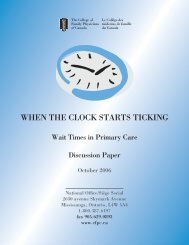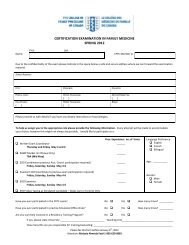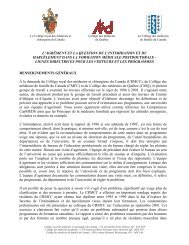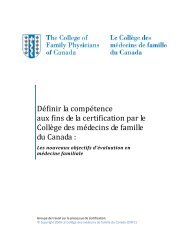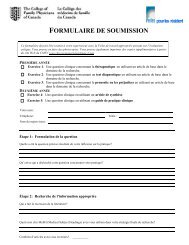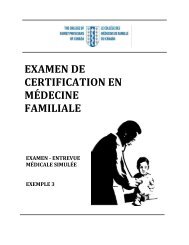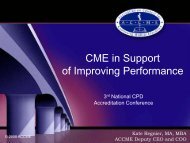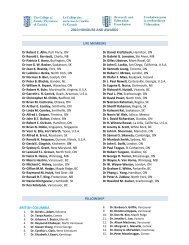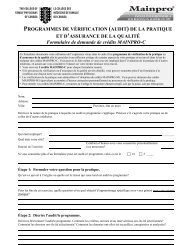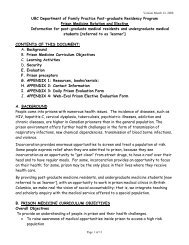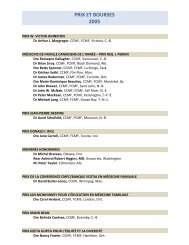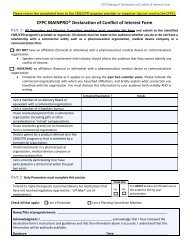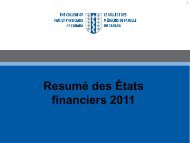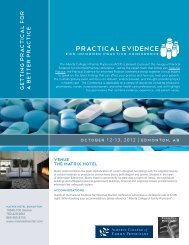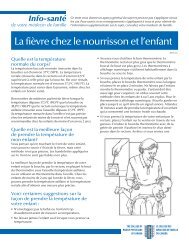A Guide to Mainpro Accreditation - The College of Family Physicians ...
A Guide to Mainpro Accreditation - The College of Family Physicians ...
A Guide to Mainpro Accreditation - The College of Family Physicians ...
Create successful ePaper yourself
Turn your PDF publications into a flip-book with our unique Google optimized e-Paper software.
4. Learning Methodology, Delivery and Environment<br />
<strong>The</strong> environment, teaching techniques, and use <strong>of</strong> audiovisual aids must be conducive <strong>to</strong> effective learning and appropriate <strong>to</strong><br />
the learning objectives.<br />
<br />
<br />
<br />
<br />
<strong>The</strong>re must be sufficient opportunity for discussion among participants.<br />
o<br />
o<br />
At least two thirds <strong>of</strong> the program should be conducted in small groups <strong>to</strong> ensure a maximum amount <strong>of</strong> groupdirected<br />
interaction.<br />
Small groups should have no more than ten (10) participants.<br />
In the case <strong>of</strong> didactic presentations, there must be adequate time set aside for speakers or presenters <strong>to</strong> address<br />
questions from participants.<br />
No social activity may take precedence over the educational activities.<br />
A representative <strong>of</strong> a commercial organization (pharmaceutical company representatives, medical device company<br />
engineers, etc.) cannot assume the role <strong>of</strong> a speaker/educa<strong>to</strong>r at <strong>Mainpro</strong>-accredited events. <strong>The</strong> only exception is where a<br />
demonstration <strong>of</strong> a product or device is considered <strong>to</strong> be an essential component <strong>of</strong> the educational event, and no<br />
physician or other health care pr<strong>of</strong>essional is qualified <strong>to</strong> perform this role. This type <strong>of</strong> participation must be approved and<br />
rationalized by event planning committee members and outlined as part <strong>of</strong> the initial accreditation application.<br />
Participants must have an opportunity <strong>to</strong> evaluate the program. Evaluation may be completed through use <strong>of</strong> forms, discussion<br />
groups, or other technique deemed appropriate and useful.<br />
<br />
<br />
<br />
<br />
<strong>The</strong> evaluation must include a question on content and presenter bias.<br />
CPD providers must retain copies <strong>of</strong> completed evaluation forms or response summaries for at least one (1) year in case<br />
the program is audited by the CFPC.<br />
<strong>The</strong> CFPC recommends that organizers provide a summary <strong>of</strong> the evaluations <strong>to</strong> all speakers and presenters for personal<br />
and pr<strong>of</strong>essional development.<br />
Feedback sought from participants should be used by CPD providers <strong>to</strong> improve future presentations <strong>of</strong> the program.<br />
For more information on evaluations, please refer <strong>to</strong> Appendix 5.<br />
Participants must be provided with and complete a post-program activity before they receive a certificate <strong>of</strong> program completion<br />
(see “Program Design and Content”).<br />
5. Ethical Standards and Disclosure<br />
<strong>The</strong> planning, content, and conduct <strong>of</strong> programs must follow acceptable ethical standards. Ethical standards must be adhered <strong>to</strong><br />
during all stages <strong>of</strong> planning and implementation <strong>of</strong> CME/CPD programs. All <strong>Mainpro</strong>-accredited programs must be able <strong>to</strong><br />
withstand public scrutiny.<br />
<br />
<br />
<strong>The</strong> planning, development, and implementation <strong>of</strong> CME/CPD programs must comply with the Canadian Medical<br />
Association's Policy on <strong>Physicians</strong> and the Pharmaceutical Industry (2007) and Rx&D's (Canada's Research-Based<br />
Pharmaceutical Companies) Code <strong>of</strong> Ethical Practices (2012). If any disagreement exists between these two, the CMA policy<br />
should prevail.<br />
Disclosure information and accompanying verbal statements should be included as part <strong>of</strong> all <strong>Mainpro</strong>-accredited<br />
programs; all speakers and presenters must disclose financial affiliations with manufacturers <strong>of</strong> products or service<br />
providers related <strong>to</strong> the presentation (see Appendix 7 for more information on disclosure <strong>of</strong> potential for conflict <strong>of</strong><br />
interest).<br />
Effective June 1, 2012<br />
All members <strong>of</strong> planning committees and speakers/presenters are required <strong>to</strong> complete the Declaration <strong>of</strong> Conflict <strong>of</strong> Interest<br />
form. Completed forms must be submitted as part <strong>of</strong> the application process (please refer <strong>to</strong> page 37).<br />
Inappropriate influence from external sources, such as funding, on any aspect <strong>of</strong> a program is unacceptable.<br />
20



